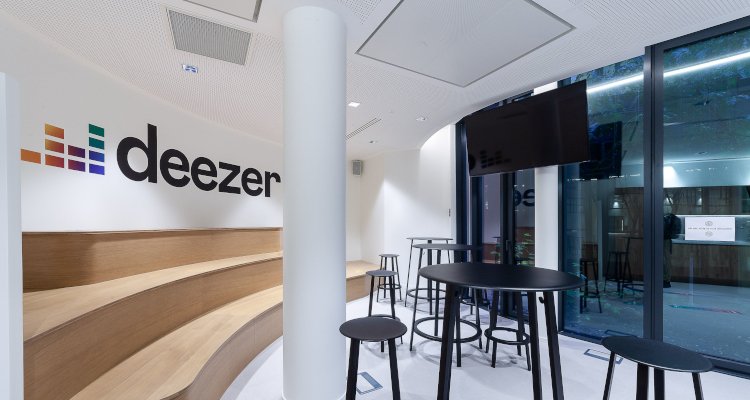Exclusive: Deezer Artist-Centric Model To Enroll ‘Leading’ Authors Society As Industry Debate Continues


An interior shot of Deezer’s Paris headquarters. Photo Credit: Deezer
Last month, Deezer and Universal Music unveiled the details of their “artist-centric” streaming model, which they say will double on-platform royalties for “professional artists.” Now, Digital Music News has learned that a “leading” authors society is set to adopt the framework as well.
A source with direct knowledge of the matter just recently reached out about the much-debated artist-centric model’s newest participant. Though a full-scale announcement – including the name of the society at hand – isn’t expected to arrive until later in October, the source made clear that the pact involves the artist-centric streaming model’s adoption on the publishing side.
The participating organization would join a growing list of companies and entities supporting the retooled compensation system, which has drawn criticism and praise alike.
Expected to go live in France sometime this quarter, Deezer’s artist-centric approach to royalties would afford “professional artists,” defined as those with 1,000 or more monthly streams from at least 500 listeners, “a double boost” on payments, according to the Access Industries-owned platform and BMG-partnered Universal Music Group (UMG).
Additionally, the publicly traded streaming company intends to offer another “double boost for songs that fans actively engage with.” The model is also expected to demonetize white-noise uploads (which Deezer says it will replace with non-royalty-bearing recordings) and double down on fraud detection.
Earlier this month, indie label group Wagram Music enrolled in the artist-centric model – a seemingly positive development that nevertheless raised additional questions about the program’s eligibility specifics.
Moreover, American Association of Independent Music (A2IM) president and CEO Richard James Burgess has supported the model, emphasizing the broader need for streaming-compensation reform and indicating that Deezer has “plans to ensure that emerging artists are not disadvantaged.”
But others in the industry aren’t convinced of the latter, with Paris-based indie powerhouse Believe having called out the “unfair ‘reverse Robin Hood’ system” and stressed the possibility that the UMG-endorsed thresholds for double royalties could be increased down the line.
Europe’s Independent Music Companies Association (IMPALA), for its part, applauded “certain aspects” of the revamped system but called for “more debate” about other elements – namely the creation of “a possible two-tier approach impacting the work of independent labels.”
Echoing the concerns and the call for continued discussion, Association of Independent Music (AIM) head Silvia Montello touched upon topics including the model’s potential to “disadvantage those navigating the first steps of their careers or working within emerging genres.”
Of course, it’ll be worth closely monitoring the royalty framework’s talks, participants, and broader industry impact in the coming months. Late September saw Deezer once again bump its monthly cost in a number of nations, and when the market closed today, the Spotify competitor’s shares were worth €2.54 (currently $2.69) apiece, reflecting a three percent slip from opening.
Link to the source article – https://www.digitalmusicnews.com/2023/10/20/deezer-artist-centric-model-society/
Recommended for you
-
Otamatone Deluxe Electronic Musical Instrument for Adults Portable Synthesizer Digital Electric Music from Japan by Cube/Maywa Denki Cool Stuff Gifts, Black [English Manual]
$79,99 Buy From Amazon -
24pcs Banjo Hooks, Banjo Tension Hooks Banjo Flat Hooks Banjo Bracket Hooks Banjo Round Hooks Banjo Hook Banjo Parts Banjo Accessory
$26,94 Buy From Amazon -
8 Key Mini Kalimba exquisite Finger Thumb Piano Marimba Musical good accessory Pendant Gift
$13,99 Buy From Amazon -
O Oasis, 4-String Ukulele, Original Version (OH-18)
$21,95 Buy From Amazon -
Orba by Artiphon | Portable synth, looper, and MIDI controller | iOS, Mac, Windows, PC | Bluetooth or USB MPE MIDI
$84,89 Buy From Amazon -
Arturia KeyLab Essential mk3 â 49 Key USB MIDI Keyboard Controller with Analog Lab V Software Included
$219,00 Buy From Amazon -
Ukulele, 21 Inch Professional Soprono Ukelele for Adults Horse Uke Beginner Kit W/Gig Bag Strap OEM Strings Hawaiian Guitar Ukalalee Yukalalee Ukalele Yukelele
$49,99 Buy From Amazon -
Brass Classic Decorative Taxi Horn Rubber Taxi Horn Vintage Circular Brass Taxi Horn With Black Rubber Bulb Bugle For Taxi/Bike/Bus/Truck/Auto Home Decor antique Taxi Horn
$39,99 Buy From Amazon













Responses